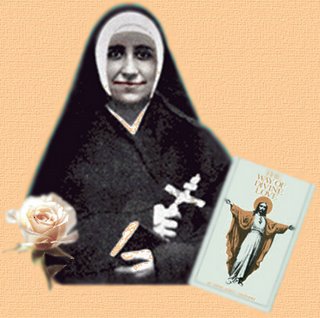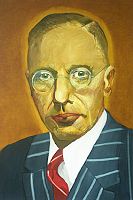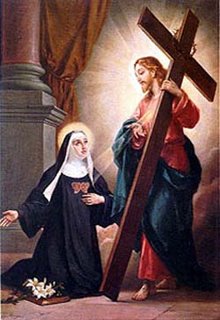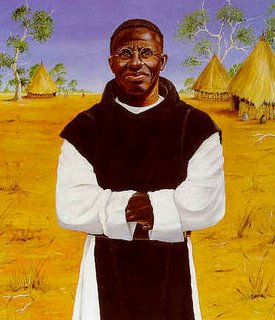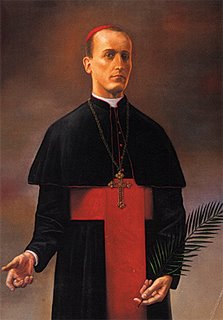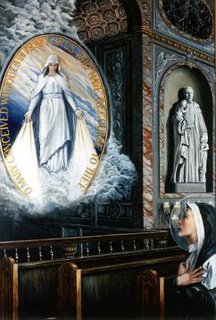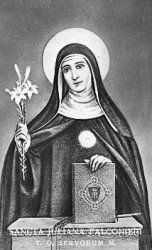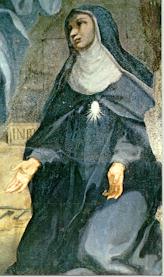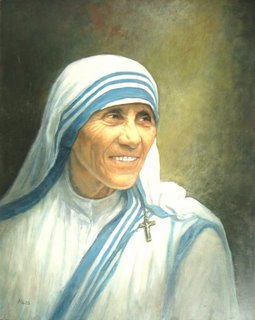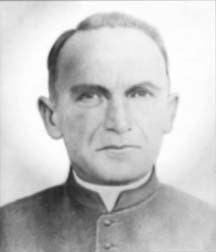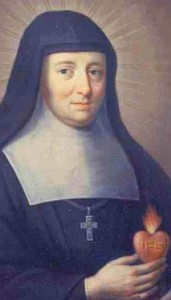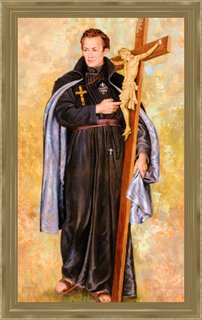
Paul Danei was born literally into his family business, as he came into the world above his fathers tobacco shop, in the year 1694. The Danei family eventually had 16 children but not all of them lived to enjoy long lives as the infant mortality rate in that era was high.
Through observing the deaths of his siblings this was able to give Paul an insight into the pain of bereavement but also how fragile life can be, the shadow of the Cross was already manifested in his life. This would lead Paul from an early age to embrace prayer and to live life as if it were his last day on earth. The whole Daneii family were known for their piety and Paul's parents, Luke and Anna Maria tried to attend daily Mass and also to instill a deep love of God and Church.
The young Paul already felt drawn to the Crucified Christ, as he contemplated the mystery of Jesus Passion. This devotion to the Passion of Christ did not lead to morbidity but instead led Paul to greater love and reverence for this Majestic God who would send His beloved Son to die in our place. Each day Paul would try and spend many hours of prayer before the Blessed Sacrament as well as attending school and his home chores.
It was plain to see that God was moving within the heart of this holy young man, for he had decided against marriage and upon the death of his Uncle who happened to be a Priest Paul was left a substantial amount of money which he declined to accept , but he did keep his uncles breviary. Already in his heart was the idea of starting a new Religious Order to honour Christ's Passion, for this was at the heart of Paul's spirituality.
Paul's obvious piety and holiness impressed many around him and soon Priests and Bishops would ask Paul to lead retreats for the people in his parish. Through this he was able to establish prayer groups and to evangelise the Faith to the poor, lonely and dispossessed, but already within Paul's mind lay the rule which he was already formulating in his heart of hearts. To live lives completely devoted to prayer, spreading the Faith, and to honour the Passion of Our Lord in particular.
With his burning zeal Paul attempted to begin this Order, which would allow men to spread the Faith but also to return to the Monastery and spend many hours contemplating the Lords Passion. The way was not always easy for Paul as he struggled to maintain the Rule of the Order as he felt God Willed it to be, for as he said to his Confessor, "I began, "to write this holy rule on the! second of December in the year 1720, and I finished it on the seventh of the same month. And be it known that when I was writing, I went on as quickly as if somebody in a professor's chair were there dictating to me. I felt the words come from my heart"
So it was that Paul began to collect a small community to spread devotion among the faithful to our Lords Passion where Jesus suffered for the salvation of sinners. This holy man was also sensitive to the needs of the people he would be dealing with and so spoke to each person with respect and dignity. Paul would speak as he found people, for those who spoke and lived simply Paul was able to reach out to them on an equal basis, and for those who were perhaps more learned Paul was able to go into greater depth about the sufferings endured by the Son of God.
Even though Paul felt this deep devotion to the Crucified Christ, he was not in himself a dour or long-faced individual but instead radiated the love of Christ to all he met, in a practical manner, without the sentimentality of emotionalism. The Mission that Paul was developing was not to make people sad but instead to challenge them to love God for who He is, and to live in a spirit of deep gratitude and awe towards God.
After living in a small community of men, Paul eventually won the approval to formulate this Order in 1725 by Pope Benedict XIII this was followed by Paul's Ordination into the Priesthood in the year 1727. Father Paul would be joined in his mission to spread the devotion to Christ's Passion by his brother, John Baptist who also joined him in the Priesthood.
Father Paul and his brother were able to establish what would become known as the Passionist Order, where they dedicated their lives to spreading the Gospel message, the devotion to Christ's Passion and retreats where people could gather in order to reflect more deeply on their spiritual path. The centre of Passionist Order was their deep sense of community and living as the early disciples did when Jesus was amongst them.
The Passionist Order would also receive the approval of their Rule in 1741 by Pope Benedict XIV, and in 1769 Pope Clement XIV confirmed the Rule which placed this particular Order among the greatest.
Father Paul himself was a man of simple needs, who led a deep prayer life and devoted himself to spreading the love of Christ to all he met. Though Father Paul began this Order he had no wish to become its Superior and instead wished to serve his fellow Priests and community as a humble servant. But because of his obvious holiness and his sense of practicalities Paul was chosen to become the Superior General which he retained for the rest of his life.
This remarkable man who began this Order which still thrives to this day was an excellent example of how to live a holy life and speak about it without patronising those he spoke with even though he was well learned.
Father Paul Danei died in the year 1775.
Saint Paul of the Cross was canonized in 1852 by Pope Pius IX.
Some Quotes
"It is very good and holy to consider the passion of our Lord, and to meditate on it, for by this sacred path we reach union with God. In this most holy school we learn true wisdom, for it was there that all the saints learned it."
"Therefore, be constant in practicing every virtue, and especially in imitating the patience of our dear Jesus, for this is the summit of pure love. Live in such a way that all may know that you bear outwardly as well as inwardly the image of Christ crucified, the model of all gentleness and mercy. For if a man is united inwardly with the Son of the living God, he also bears his likeness outwardly by his continual practice of heroic goodness, and especially through a patience reinforced by courage, which does not complain either secretly or in public. Conceal yourselves in Jesus crucified, and hope for nothing except that all men be thoroughly converted to his will."
""Oh, what beautiful virtues can be practiced in sickness, especially a total love for one’s own abjection, gratitude and gentleness of heart to those who attend you, and blind obedience to the doctor and the infirmarian, always with a happy face."
Peace of Christ to ALL
Copyright © 2006 Marie Smith. All rights reserved.
Roman Catholic
Catholic Saints
